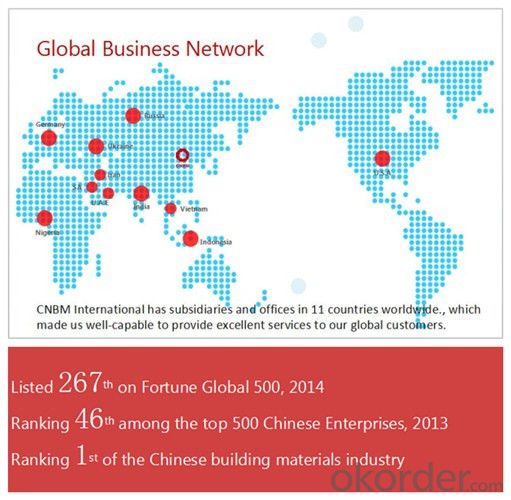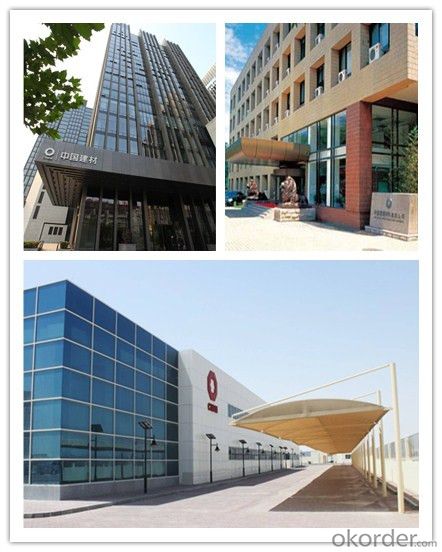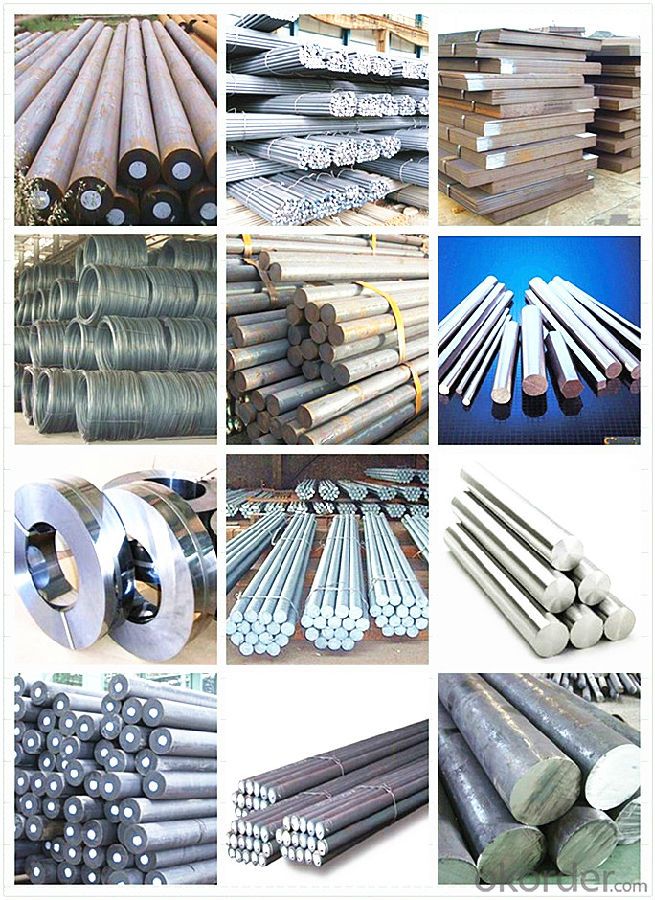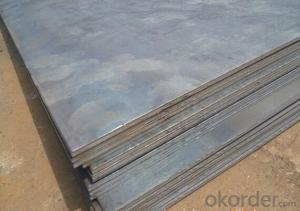DIN.1.2080Alloy Tool Steel D3 Mild Steel Plate in Stock
- Loading Port:
- Tianjin
- Payment Terms:
- TT OR LC
- Min Order Qty:
- 3 m.t.
- Supply Capability:
- 100000 m.t./month
OKorder Service Pledge
OKorder Financial Service
You Might Also Like
Item specifice
DIN.1.2080Alloy Tool Steel D3 Mild Steel Plate in Stock
Detailed Information of DIN.1.2080Alloy Tool Steel D3 Mild Steel Plate in Stock
| C | Si | P | S | yield Strength MAp | Tensile strength MAp | Elongation % | ||
| A36 | 0.24 | 0.4 | 0.045 | 0.03 | 250 | 400-520 | 26 | |
| C | Si | Mn | P | S | Cu | |||
| A283 | ≤0.27 | 0.15-0.4 | ≤0.9 | ≤0.035 | ≤0.04 | ≥0.2 | ||
| Thickness: | 6mm, 8mm, 12mm, 16mm, 20mm, 25mm, 30mm, 50mm, 80mm, 100mm, 150mm, 200mm | |||||||
| Width: | 1500mm, 1800mm, 2000mm, 2200mm, 2500mm | |||||||
| Length: | 6000mm, 8000m, can cut to width and length | |||||||
| Packing Details; | according to customer‘s require or export’s standard | |||||||
| Delivery time; | 7 days for stock sizes, 20-25 days for new production sizes | |||||||
| Port: | Tianjin China | |||||||
Related Products Overviews of DIN.1.2080Alloy Tool Steel D3 Mild Steel Plate in Stock
Product Name | Typical Grades | Diameter(mm) | Standard Adopted |
Carbon Steel | 20 (1020/S20C/C22) |
Ø16-Ø300 |
GB/SAE/ JIS/DIN |
40 (1040/S40C/C40) | |||
45 (1045/S45C/C45) | |||
Bearing Steel | GCr9 (51100/SUJ1) |
Ø12-Ø250 | |
GCr15 (52100/SUJ2/100Gr6) | |||
GCr9SiMn (A485-Gr.1/SUJ3) | |||
Cr-Mo Steel | 20Cr (5120/SCr420H/20Cr4) |
Ø12-Ø250 | |
40Cr (5140/SCr440/41Cr4) | |||
42CrMo(4140/SCM440/42CrMo4) | |||
Gear Steel | 20CrNiMo |
Ø16-Ø600 | |
20CrMn(5115/SMnC420/20MnCr5) | |||
20CrNiMo(8620/SNCM220/20CrMiMo2) |
Related Products Application of DIN.1.2080Alloy Tool Steel D3 Mild Steel Plate in Stock
Carbon Steel | l Mold bottom l Plastic mold l Construction machinery parts l Automobile parts l Security grills l Screens l Construction |
Bearing Steel | l Aerospace l Navigation l Nuclear energy l Chemical industry l Electronic information l Petrochemical l Instrument and meter l Transportation |
Cr-Mo Steel | l Mechanism & Fasteners gear l Stressed components for vehicles l Engines and machines l Parts of larger cross-section |
Gear Steel | l All kinds of gears l Statically and dynamically stressed component for vehicles l Engines and machine l Larger cross-section parts l Crankshafts |
Company Introduction of DIN.1.2080Alloy Tool Steel D3 Mild Steel Plate in Stock
CNBM International Corporation is the most import and export platform of CNBM group(China National Building Material Group Corporation) ,which is a state-owned enterprise, ranked in 270th of Fortune Global 500 in 2015.
With its advantages, CNBM International are mainly concentrate on Cement, Glass, Iron and Steel, Ceramics industries and devotes herself for supplying high quality series of refractories as well as technical consultancies and logistics solution.


After-sale service | l CNBM provides the services and support you need for every step of our cooperation. We’re the business partners you can trust; you can relax and get on with doing business. l For any problem, please kindly contact us at any your convenient time, we’ll reply you in our first priority within 24 hours
|
Advantages
| l Industry experience over 20 years. l Shipment of goods -More than 70 countries worldwide. l The most convenient transport and prompt delivery. l Competitive price with best service. l High technical production line with top quality products. l High reputation based on best quality products.
|
Packaging & Delivery of DIN.1.2080Alloy Tool Steel D3 Mild Steel Plate in Stock
Packaging Detail | Sea worthy packing /as per customer's packing instruction |
Delivery Detail | 15 ~ 40 days after receiving the deposit |
Products Show

FAQ:
Are you a trading company or manufacturer? | Manufacturer |
What’s the MOQ? | 3 metric ton |
What’s your delivery time? | 15-35 days after downpayment received |
Do you Accept OEM service? | Yes |
what’s your delivery terms? | FOB/CFR/CIF |
What's the Payment Terms? | 30% as deposit,70% before shipment by T/T |
Western Union acceptable for small amount. | |
L/C acceptable for large amount. | |
Scrow ,Paybal,Alipay are also ok | |
Why choose us? | Chose happens because of quality, then price, We can give you both. Additionally, we can also offer professional products inquiry, products knowledge train (for agents), smooth goods delivery, excellent customer solution proposals. |
What's your available port of Shipment? | Main Port, China |
What’s your featured services? | Our service formula: good quality+ good price+ good service=customer's trust
|
Where are your Market? | Covering more than 160 countries in the world |
- Q:Can special steel be coated?
- Indeed, it is possible to coat special steel. Coating special steel yields numerous advantages such as resistance to corrosion, improved visual appeal, enhanced durability, and heightened functionality. Multiple coating materials and techniques are available for special steel, encompassing electroplating, hot-dip galvanizing, powder coating, and ceramic coating, among others. These coatings effectively safeguard the steel against environmental elements, chemical exposure, and normal wear and tear, thus extending its lifespan and preserving its performance. Moreover, coatings can be tailored to impart specific characteristics, such as non-stick surfaces, heat resistance, or anti-microbial properties, depending on the intended application of the special steel.
- Q:What are the thermal properties of special steel?
- Special steels are highly sought-after in various applications due to their unique thermal properties. A key property of special steel is its exceptional thermal conductivity, enabling efficient heat transfer and dissipation. This characteristic renders special steel perfect for heat exchangers, facilitating effective heat transfer between fluids. Moreover, special steel boasts a high melting point, ensuring its structural integrity even under extreme temperatures. Consequently, it finds suitability in applications that involve exposure to extreme heat, such as furnaces or aerospace engines. Additionally, special steel exhibits superb thermal expansion properties, expanding and contracting consistently with temperature changes. This minimizes the risk of warping or cracking, which is crucial in applications requiring dimensional stability, such as precision instruments or high-temperature machinery. Furthermore, special steel possesses excellent resistance to thermal fatigue. It can endure repeated heating and cooling cycles without developing cracks or weakening. This property proves highly advantageous in applications subjected to cyclic thermal loading, such as automotive engine components or turbine blades. In conclusion, special steel offers high thermal conductivity, a high melting point, exceptional thermal expansion properties, and resistance to thermal fatigue. These desirable thermal properties make it a preferred choice across various industries, including automotive, aerospace, energy, and manufacturing, where thermal performance and durability are paramount.
- Q:What are the limitations of using special steel?
- Some limitations of using special steel include its high cost compared to regular steel, limited availability due to specific alloy compositions, and the need for specialized knowledge and equipment to work with it. Additionally, special steel may have lower ductility and toughness compared to other materials, making it less suitable for certain applications that require high impact resistance or flexibility.
- Q:What are the different forming techniques used for special steel?
- Some of the different forming techniques used for special steel include forging, casting, rolling, and extrusion.
- Q:Can special steel be used in the food processing industry?
- Yes, special steel can be used in the food processing industry. Special steel, such as stainless steel, is commonly used in food processing equipment and utensils due to its corrosion resistance, durability, and ability to maintain hygiene standards. It is suitable for applications that require frequent cleaning, exposure to moisture, and contact with food, ensuring the safety and quality of food processing operations.
- Q:How does special steel contribute to the overall economy?
- Special steel contributes to the overall economy in various ways. Firstly, special steel is widely used in industries such as automotive, construction, energy, and machinery, among others. Its unique properties and characteristics make it a preferred material for manufacturing high-performance and durable products. This demand for special steel drives economic growth by creating jobs in the steel industry and related sectors. Additionally, the production and export of special steel contribute to a country's export earnings, thus boosting its trade balance and overall economic performance. Many countries with thriving steel industries, such as China, Japan, and Germany, have significantly benefited from the export of special steel products. Moreover, the development and advancement of special steel technologies have a positive impact on innovation and research and development (R&D). Companies in the steel industry invest in R&D to improve the properties and performance of special steel. This not only leads to the creation of new and better steel alloys but also drives innovation in other industries that rely on special steel products. Furthermore, special steel plays a crucial role in infrastructure development. It is used in the construction of bridges, buildings, pipelines, and other critical infrastructure projects. The use of special steel in these projects enhances their durability, safety, and longevity, resulting in cost savings over the long term. This, in turn, contributes to economic development by promoting sustainable and efficient infrastructure. Lastly, special steel also contributes to the overall economy by fostering a competitive manufacturing sector. Countries with a strong special steel industry have a competitive advantage in various industries, as they can produce high-quality products more efficiently. This attracts investment, encourages industrial growth, and boosts overall productivity, leading to economic prosperity on a national scale. In conclusion, special steel contributes to the overall economy through its widespread use in various industries, its role in driving export earnings, its impact on innovation and R&D, its contribution to infrastructure development, and its ability to foster a competitive manufacturing sector.
- Q:How does special steel contribute to the electrical conductivity of products?
- Several methods can be employed to utilize special steel in enhancing the electrical conductivity of products. Firstly, the formulation of special steel alloys can be tailored with specific chemical compositions that enhance its electrical conductivity. For instance, the addition of elements like copper, silver, or nickel to the steel creates additional pathways for the flow of electric current, thus increasing the conductivity. Moreover, manipulating the microstructure of special steel can also contribute to improved electrical conductivity. By controlling the size and orientation of the steel's grains, the resistance to the flow of electrons can be reduced, consequently enhancing the overall conductivity of the material. Furthermore, subjecting special steel to heat treatment or other processes can further enhance its electrical conductivity. Techniques such as annealing or tempering can effectively eliminate impurities and enhance the crystal structure of the steel, resulting in improved conductivity. In addition to these methods, special steel can also be designed with low magnetic permeability, reducing its resistance to the flow of magnetic fields. This characteristic proves advantageous in applications where minimizing electromagnetic interference is crucial, such as in electrical connectors or transformers. To summarize, special steel contributes to the electrical conductivity of products through various means, including its chemical composition, microstructural control, heat treatment, and low magnetic permeability. By optimizing these factors, special steel can significantly enhance the performance of electrical components and systems.
- Q:How does special steel play a role in the defense sector?
- Special steel plays a crucial role in the defense sector due to its exceptional strength, durability, and resistance to heat, corrosion, and impact. It is used to manufacture various defense equipment and vehicles, including tanks, submarines, aircraft carriers, and ballistic missile systems. Special steel ensures the structural integrity and performance of these defense assets, providing enhanced protection, firepower, and overall operational efficiency in critical military operations.
- Q:How does special steel contribute to the manufacturing aftermarket industry?
- The manufacturing aftermarket industry greatly relies on special steel to enhance the performance, durability, and reliability of components and equipment. Special steel is particularly valuable because it can withstand extreme conditions like high temperatures, corrosive environments, and heavy loads. This makes it an ideal choice for producing critical parts in industries such as automotive, aerospace, energy, and machinery. In the manufacturing aftermarket industry, special steel is commonly used to create replacement parts for machinery or equipment that have deteriorated or been damaged over time. By using special steel, these replacement parts can meet the specifications set by the original equipment manufacturer (OEM) in terms of strength and resilience. Moreover, special steel enables the development of innovative designs and the production of lightweight and efficient components. This leads to improved equipment performance, reduced energy consumption, and increased productivity. For instance, in the automotive industry, special steel is used to make lightweight engine components, resulting in better fuel efficiency and lower emissions. Furthermore, the use of special steel in the manufacturing aftermarket industry helps to reduce maintenance and downtime costs. By using high-quality steel, the longevity of replacement parts is increased, reducing the need for frequent repairs or replacements. Consequently, this decreases production downtime and associated expenses while enhancing overall equipment reliability. Additionally, special steel offers a wide range of customization possibilities, allowing manufacturers to tailor the material properties to meet specific requirements. This flexibility enables the development of unique solutions and the production of specialized components that meet the demands of different industries. It also enables manufacturers to address specific challenges related to wear resistance, hardness, or toughness, which are crucial factors in the aftermarket industry. In conclusion, special steel plays a crucial role in the manufacturing aftermarket industry by enhancing the performance, durability, and reliability of replacement parts. Its ability to withstand extreme conditions, enable innovative designs, reduce maintenance costs, and offer customization options make it an indispensable material in the production of components and equipment across various industries.
- Q:What are the different heat treatment processes used in special steel?
- Some of the different heat treatment processes used in special steel include annealing, normalizing, tempering, quenching, and case hardening.
1. Manufacturer Overview |
|
|---|---|
| Location | |
| Year Established | |
| Annual Output Value | |
| Main Markets | |
| Company Certifications | |
2. Manufacturer Certificates |
|
|---|---|
| a) Certification Name | |
| Range | |
| Reference | |
| Validity Period | |
3. Manufacturer Capability |
|
|---|---|
| a)Trade Capacity | |
| Nearest Port | |
| Export Percentage | |
| No.of Employees in Trade Department | |
| Language Spoken: | |
| b)Factory Information | |
| Factory Size: | |
| No. of Production Lines | |
| Contract Manufacturing | |
| Product Price Range | |
Send your message to us
DIN.1.2080Alloy Tool Steel D3 Mild Steel Plate in Stock
- Loading Port:
- Tianjin
- Payment Terms:
- TT OR LC
- Min Order Qty:
- 3 m.t.
- Supply Capability:
- 100000 m.t./month
OKorder Service Pledge
OKorder Financial Service
Similar products
New products
Hot products
Hot Searches
Related keywords

































